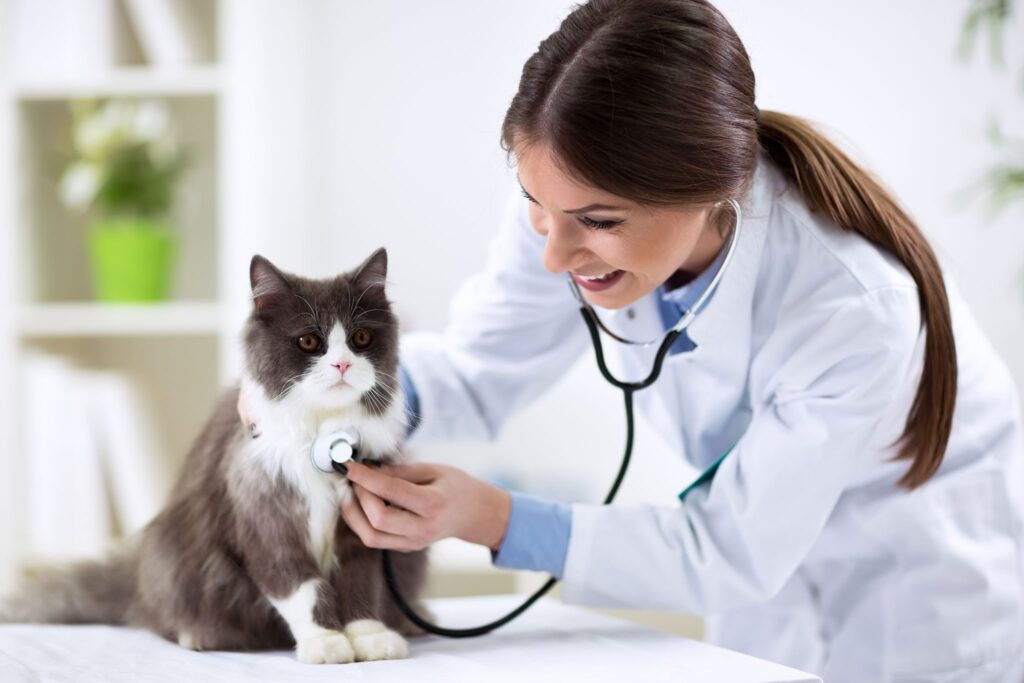Between June and December 2019 HCMT has 14 free and low-cost spay/neuter clinics scheduled for stray/feral and rescued/pet cats. Each spay and neuter reduces the number of homeless cats in the Pittsburgh region, and helps everyone be a part of the solution. Clinics fill up fast and registration well ahead of time is required.
NO-CHARGE CLINICS (ferals only)
- May 25 half sponsored by Jason & Julie Ray and half by anonymous donor
- June 22 sponsored in memory of Jeanne T. Richey
- July 27 sponsored in memory of Betty Moore
- August 24 sponsored by Nadine Piontka
- October 5 sponsored for National Feral Cat Day
- November 9 sponsored by Spaghetti Dinner Fundraiser
- December 7 sponsored by Stacy’s Stuff
FAST TRACK CLINICS (ferals $30)
- June 8
- July 13
- August 10
- September 28
- October 19
- November 23
- December 21
More dates may be announced and dates are subject to change. Check www.homelesscat.org/clinic-info for the most up to date information.
The importance of spay and neuter for all cats
Cats end up living on the street in many ways but usually not by their own choice. They are left behind when people move, they are placed outside as if they are trash when they are no longer wanted, sometimes they unintentionally escape. The reasons cats end up outside may be behavioral, or their owner’s financial or emotional issues, but cats end up abandoned and need the help of the community to rescue them and find them another home.
Cats can begin reproducing as young as four months old. An unspayed female cat can have an average of two litters per year with an average of four kittens, some are even more prolific. Her kittens can be ready to produce kittens four months after they are born. If none are spayed or neutered by the next year, well, you can do the math.
But kittens can be spayed and neutered as young as two months, weighing at least two pounds. All those extra kittens never need to be born.
HCMT has spayed or neutered over 1,000 stray, feral and pet cats per year since its founding in 2000. Clinics in the spring and summer often treat over 100 cats at each clinic, roughly twice each month, and more with trapping and rescuing cats between clinics.
Think about that for a minute now…spay and neuter surgeries each year for over 1,000 stray, feral and owned cats. With the reproductive lives of that many cats effectively put to an end, imagine how many other kittens won’t end up out on the streets or in shelters?
What is the Homeless Cat Management Team?
The Homeless Cat Management Team is a freestanding “Trap-Neuter-Return” (TNR) organization in the Pittsburgh region. Their mission is to lead the way in ending the overpopulation of companion animals in our region by providing high-volume, high-quality, low-cost sterilization. They also assist and support community cat caretakers who work with HCMT with trapping, transportation, cat food and shelter and veterinary care.
HCMT also has clinics open to the public for rescued and pet cats, which provides an alternative for people with limited incomes or several cats who need to be spayed and neutered at one time, such as an “accidental” litter of kittens and their mother.
As part of HCMT’s TNR process and mission to end feline overpopulation and reduce populations of cats living outdoors, volunteers also assess all kittens and friendly cats HCMT has rescued for adoptability and socialization, and after spay/neuter and age-appropriate vaccines offer them for adoption through their sister organization, a network of volunteer foster homes called Pittsburgh C.A.T.
Homeless Cat Management Team Clinic Information
Feral Cats vs Rescue Cats
A feral is a cat that will be spayed or neutered, given a rabies vaccine and returned to the outdoor location where it was trapped after recovery from surgery, a process known as “trap-neuter-return” or TNR. A rescue is a cat that either has been or will be adopted as a pet after surgery. Only feral cats are eligible for No-Charge clinics. Both feral and rescue cats can be treated at Fast Track Clinics.
How to register for a clinic
All clinics are held at HCMT’s clinic at 207 Allegheny St, Tarentum, PA 15084. You must pre-register for any clinic. Walk-ins are not permitted.
By Phone: call 412-321-4060 and leave a message. Please include your name and phone number in your message. Someone will return your call and complete your pre-registration. HCMT is all volunteer and this may take some time. Clinics fill up quickly and it’s best to call at least two weeks in advance of the clinic you want to attend.
By Email: Email cathomeless@gmail.com with your name, number of spots you need and which date you are registering for. You will receive a confirmation email ONLY if you are registered.
Feral cats must arrive in a standard humane box trap (Havahart, Safe-guard, Tomahawk, Tru-Catch, etc.) for the safety of all involved. Rescue and owned cats can arrive in carriers, one cat per carrier. They will be placed back in their carrier or trap for recovery after surgery.
Volunteer
HCMT also needs volunteers for clinics, up to 20 per clinic for various duties and different shifts, with most of them not requiring medical training. On the website you’ll find a link to the signup to volunteer for each of the clinics. HCMT also needs volunteers who love cats to help daily to feed, medicate and play with the cats in our clinic for medical treatment.
Support, donate and sponsor
HCMT opened their own clinic space in Tarentum, north east of Pittsburgh. Their free clinics are funded in part by donations from individuals, but the biggest portion of the funding is a $1,500 sponsorship by one donor. HCMT would love to offer more opportunities for clinics, so consider sponsoring one yourself, or your business or an organization. If you are interested in partially or fully sponsoring a clinic, send an email with your contact information and details to cathomeless@gmail.com. We are all volunteer, and sometimes the community’s needs for help with cats is enormous, but we will respond.
Sponsors for the clinics listed above include family members of board members and volunteers. The family of Milton Lendl sponsored a clinic in February. He was the father of a board member, grew up on a farm, was an Ivy League graduate and a real animal lover according to his daughter Lisa. His wife Jeanette Lendl regularly sponsors clinics in his memory and also runs a small sale table at clinics to raise extra money.
If Samantha Ginsburg ever won the lottery, she would use the money to spay and neuter every cat and dog. Until then, Samantha and her family have been sponsoring HCMT clinics and this will be their fifth year supporting us. When she is not caring for her own cats or her community cat colonies she can be found volunteering with Kopy Kat Sanctuary. Her mission is to advocate for the voiceless and to do her part to educate on the importance of spay, neuter and TNR.
In May 2017 HCMT received a call for help for a half dozen or so kittens dumped on a farm, but when a volunteer picked up the carriers holding the kittens she found 24 kittens in each carrier and one adult cat who was not their mother. The kittens were malnourished and full of fleas and parasites with upper respiratory infections bordering on pneumonia and infected eyes that could leave them totally blind. In July after two months of treatment those kittens were well and healthy and lost very few eyes, and all have been adopted. Many generous people saw HCMT’s need and donated money, goods and volunteer time, and what was leftover sponsored a clinic to hopefully prevent that sort of thing from happening again.
The Fund for Feral Cats is a Pittsburgh organization that assists local animal welfare organizations in their mission. They are sponsoring the clinic closest to National Feral Cat Day.
In April 2019 HCMT held its fourth annual Spaghetti Dinner Fundraiser, raising $14,487.15 which sponsored a clinic and helps cover the costs of rescues like the 48 kittens, hoarding cases in which HCMT has assisted the Pittsburgh Police in rescuing cats, the everyday expenses of rescuing cats and caring for rescued and foster cats at our clinic building between spay/neuter clinics. The goal is to find homes for every cat and prepare them with spay or neuter surgery, all age-appropriate vaccinations, a microchip, and any medical care they need.
Every clinic reduces the populations of cats living on the streets and prevents the births of potentially thousands of kittens. Any donation would help defray the cost of these clinics and help cats living outdoors, in shelters and even in foster homes. A small donation in honor of one of your cats or a person who was instrumental in teaching you about cats would help all cats in need. Also, if you know of an individual, an organization or a group of people who would like to make a donation and can sponsor a free clinic, you would have a huge impact on the lives of cats in the Pittsburgh area.
Volunteer
Volunteer or donate. Call Homeless Cat Management Team hotline and leave a message, 412-321-4060 or visit www.homelesscat.org to find more information and to find links to our Facebook groups.



